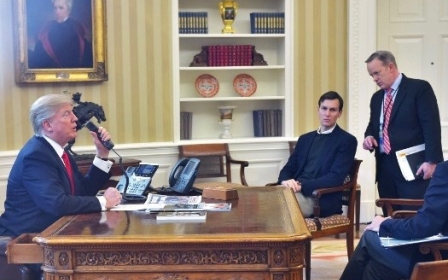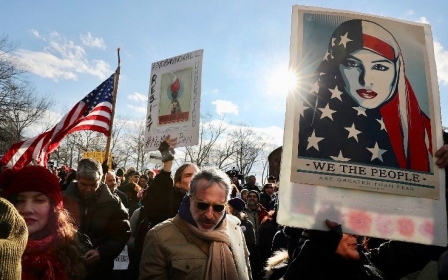Iranian missile test stokes tensions with US and allies
The United States has been accused of inflaming tensions after it called for an urgent meeting of the UN Security Council in response to an Iranian ballistic missile test.
The US requested the emergency meeting after the Israeli ambassador to the United Nations called for council action.
"In light of Iran's January 29 launch of a medium-range ballistic missile, the United States has requested urgent consultations of the Security Council," the US mission said in a statement.
|
Iran carried out a test launch of a medium-range ballistic missile that exploded after flying 1,010km on Sunday according to a US official.
But before Security Council talks on Tuesday, Iran's foreign minister, Mohammad Javad Zarif, warned the US against "creating new tensions" with Tehran over ballistic missile tests.
"We hope that Iran's defence programme is not used by the new US administration... as a pretext to create new tensions," Zarif said in a news conference with visiting French counterpart Jean-Marc Ayrault.
Russia's Deputy Foreign Minister Sergei Shoigu accused the US of "heating up the situation".
"Such actions, if they took place, do not breach the resolution," he was reported as saying by the Interfax news agency.
But the EU warned Iran not to stoke mistrust.
"The EU reiterates its concern about Iran’s missile programme and calls upon Iran to refrain from activities which deepen mistrust, such as ballistic missile tests," an EU foreign affairs spokeswoman said.
Trump and Iran
Tehran agreed in 2015 to curb its nuclear programme in return for the lifting of sanctions.
Iran says its missiles do not breach the resolutions due to their defensive nature, and the weapons are not designed to carry nuclear warheads.
But Bob Corker, the chairman of the US Senate's foreign relations committee, said on Monday that he would work with other politicians and the Trump administration to hold Iran accountable.
During the US election race, Donald Trump branded the Iranian nuclear deal as "the worst ever negotiated", and told voters he would rip it up or seek a better agreement.
On Sunday, Trump spoke by telephone to Saudi Arabia's king, Salman, a close ally in the Middle East. A White House statement said the two leaders agreed on the need to address "Iran's destabilising regional activities".
The US president also included Iran among seven countries whose citizens are barred from entry into the US for 90 days.
The move sparked protests across the US and across the world as travellers and visa holders from Iran, Iraq, Syria, Yemen, Libya, Sudan and Somalia were barred entry.
France to 'defend' nuclear deal
News of the latest test came as the French foreign minister, Ayrault, arrived in Tehran on a two-day trip.
He promised on Monday to defend Iran's nuclear deal, but said it was imperative Tehran abide strictly by its conditions.
Ayrault said it was in the "common interest" that the 2015 accord was obeyed.
He said that while Iran had "largely" honoured the deal's terms, it had tested the spirit of the accord over the past year by carrying out several ballistic missile tests.
"France has expressed its concern at Iran's continuation of its ballistic missile tests on several occasions," he added.
Israeli pressure
|
Israel's ambassador to the UN, Danny Danon, said the Iranian missile test violated UN resolutions on ballistic missiles that could have a nuclear capability.
"The international community must not bury its head in the sand in the face of this Iranian aggression," said Danon.
"The Security Council members must act immediately in response to these Iranian actions which endanger not only Israel, but the entire Middle East."
It was the first request for council consultations made by the US since new ambassador Nikki Haley took office.
Trump is due to meet Israeli Prime Minister Benjamin Netanyahu on 15 February.
New MEE newsletter: Jerusalem Dispatch
Sign up to get the latest insights and analysis on Israel-Palestine, alongside Turkey Unpacked and other MEE newsletters
Middle East Eye delivers independent and unrivalled coverage and analysis of the Middle East, North Africa and beyond. To learn more about republishing this content and the associated fees, please fill out this form. More about MEE can be found here.




